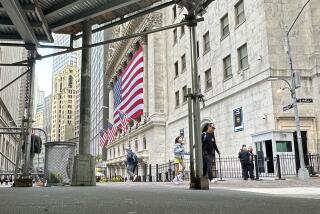Expectation of Higher Interest Rates Sends the Market Into a Tailspin : Briton’s Comments Add to Concerns; Dow Jones Industrials Dive 37.80
NEW YORK — Rising interest rates threw new confusion into an already frazzled stock market Wednesday, slicing 37.80 points from the Dow Jones industrial index.
The Dow, which closed at 1,965.85, was off by as much as 48 points earlier in the day as investors reacted to increases in many banks’ prime lending rates and speculation that more hikes lie ahead. Comments from Nigel Lawson, British chancellor of the exchequer, suggesting a possible worldwide rise in rates stirred speculation that the Federal Reserve might compete with other central banks in raising rates to support the dollar.
Market analysts worried that the Fed might overshoot in its efforts to check inflation and tip the economy into a recession. “At a time like this, people start wondering, why hold common stocks?” said William J. King, chief equities trader at Nikko Securities in New York.
Volume on the New York Stock Exchange was 176.72 million shares, compared to Tuesday’s 131.20 million.
Stock Index Futures Selloff
Some traders said the market’s slide was exacerbated by computer-driven program trading, even though a handful of major investment firms announced Tuesday that they would no longer execute certain program trades for their own accounts.
Worries about rates triggered a selloff in stock index futures, and as the futures prices fell below those of the underlying stocks, program traders jumped in with index-arbitrage programs. Index arbitrage is a kind of program trading in which players seeks to profit from the disparities between stock index prices and prices of the underlying stocks.
Even as program trading hastened the market’s slide, former Treasury Secretary Donald T. Regan was testifying before Congress that index arbitrage should be banned to restore public confidence in the markets.
Traders said much of the day’s volume came from trading designed to capture stock dividends. The most actively traded stock on the New York Stock Exchange was just such an issue, Consolidated Edison, the New York utility. About 21 million shares of Con Edison changed hands as the stock fell 1/2 to 42.
Remembering Last Fall
Analysts said bad news in the current bear market has tended to freeze trading rather than stimulate investors to sell shares. “There’s not so much selling pressure as there is lack of bids and interest,” said Gene Jay Seagle, market analyst at Gruntal & Co. in Manhattan.
Some analysts have recently contended that dividend-capture strategies account for one-third of the current trading volume, while takeover speculation and program trading account for another third, and long-term investments the remainder.
Some analysts observed that the prime rate increases at the major money-center banks--to 9% from 8.5%--was the first since shortly before the stock market’s crash last October. But with stocks already in the grip of a bear market, few believed that another sharp slide was imminent.
“Prices have just sort of been dribbling down, and you’re going to see more dribbles,” said Edward F. Nicoski, market analyst at the Piper, Jaffray & Hopwood brokerage in Minneapolis. He said he had noticed many investment portfolio managers reallocating money to bonds from stocks.
As the Dow fell Wednesday, the broader Standard & Poor’s 500-stock index plunged 4.31 to 253.31, and the NYSE composite index lost 2.27 to 143.48. Nearly 1,330 issues on the Big Board fell, while 250 advanced.
The American Stock Exchange market value index fell 4.18 to 295.63. On the over-the counter market, the NASDAQ composite index slid 6.19 to 369.24. Declining NASDAQ issues outnumbered gainers 1,799 to 516.
Losers for the session included all 30 of the stocks that make up the Dow industrials. International Business Machines slid 2 1/8 to 108 3/4, while F. W. Woolworth was off 1 to 52 3/4, United Technologies was down 1 to 37 and International Paper lost 1 3/8 to 41 7/8.
The day’s winners included Tech-Sym, which gained 2 to 14 1/2 as Mason Best, a Dallas investment firm, increased its stake in the company to 5.1%. Mason Best said it may purchase more shares.
Dayton Hudson gained 1 1/2 to 35 5/8 amid speculation that Woolworth might try to acquire it. Woolworth declined comment.
Lorimar Telepictures, down Tuesday on news that it has reached an agreement in principle to be acquired by Warner Communications, lost another 1/8 to 12 5/8. Warner fell 1 to 31 7/8.
WMS Industries rose 3/8 to 7 7/8 after the chairman of National Amusements said he will seek federal clearance to acquire control of the company. Sumner M. Redstone, the National Amusements chairman, said he and his company now own 23.7% of WMS.
At the Tokyo Stock Exchange, the Nikkei index closed at 27,161.05, down 251.20. In London, the Financial Times 100-stock index finished down 35.8 at 1,756.8.
More to Read
Inside the business of entertainment
The Wide Shot brings you news, analysis and insights on everything from streaming wars to production — and what it all means for the future.
You may occasionally receive promotional content from the Los Angeles Times.











